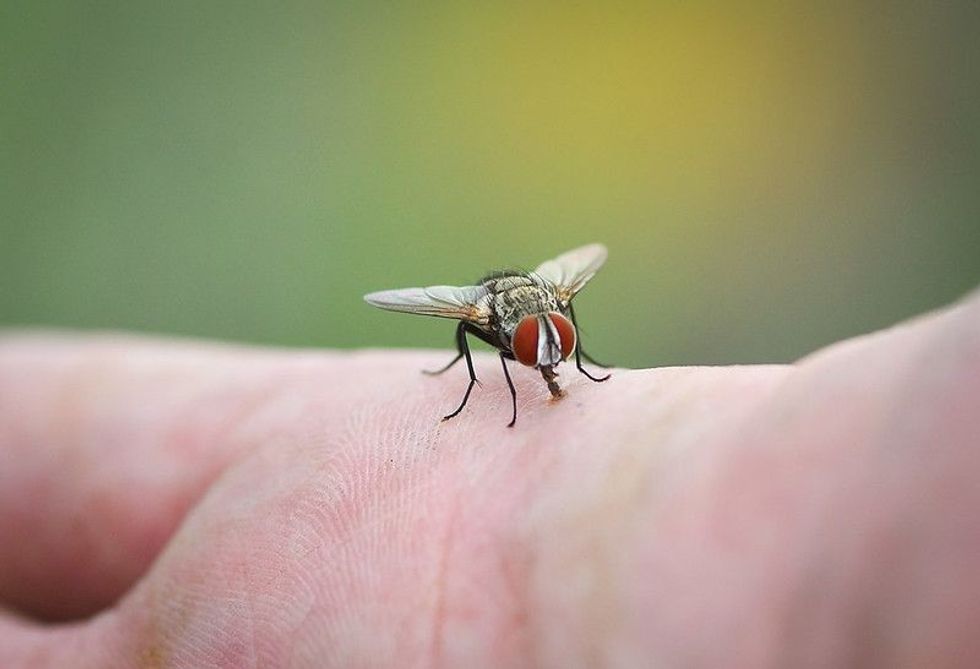The flies belong to the insect class in the order Diptera.
Flies have movable heads and a pair of large compound eyes with just one pair of wings. They have limited color vision, but some studies have shown that flies are attracted to blue or green light and repel yellow light.
Would you believe it if someone said flies are good? Flies do play a very crucial role in our ecosystem and they act as pollinators.
They gain extreme importance as pollinators in wet and cold environments. The flies constitute the second-largest group of pollinators after bees and wasps. However, they also become a subject of annoyance as they colonize in groups and become significant carriers of many diseases, and threaten our pest control situation.
Did you know that flies were the cause of the death of 5,000 soldiers in the Spanish-American War? Whereas only 4,000 soldiers had died in the actual war? Now we do not want to do anything with these flies, do we?
If you enjoyed our fun facts on flies, why don't you explore more interesting facts on Spotted lanternfly facts and where do flies go at night, here on Kidadl.
Where do flies come from in winter?
Have you thought about where do flies go in winter? They don't go anywhere, they stick around to survive the winter. The common species of flies that often emerge during the winter are the house fly, the cluster fly, and the fruit fly, to name a few.
So how do they make it to your home in winter? Why are there numerous flies hovering around in December?
The answer is by late summer or early fall, these pests make their way into our homes. They trap all the warmth or heat they require, and when cold weather sets in during winter, they seek cracks or gaps in homes, settling down behind warmer spots in the walls, basement, or attics.
Fruit flies may follow you through grocery bags that you bring home. They have an excellent affinity for rotting and fermenting things. I don’t know about you, but I am not keen on having these adult flies like cluster flies or house flies in my home over winter.
Do flies die in cold weather?
You may wonder, even if they made into my home by winter, will these cluster flies or house flies beat the freezing temperatures? Will the insect infestation succumb to dropping temperatures? Keep reading and let's find out more.
What if these flies freeze at a cold temperature? Sorry, there is no coming back from a frozen state for these insects, the freezing temperature is detrimental to their survival, and they cannot spring back to life from the frozen state.
The activity of flies in winter slows down when temperatures drop below 50°F (10°C). Did you know that a temperature below 40°F (4.4°C) kills house flies? In the frigid winter months, you will see flies dying.
How do flies survive in winter?

Where do flies go in winter? How do they spend the winter and enter spring with a new lease of life and become active again? Let us now discover how these insects are adapted to survive the winter by understanding the fly life cycle.
They survive the winter by entering a state of diapause. In the state of diapause, development is slowed down.
In this manner, they conserve their body heat and energy levels. Some flies, like the cluster flies, are seen laying eggs in warmer places during autumn.
The adult flies lay eggs and die due to extreme temperatures, but their eggs hatch and multiply in the warmer hideouts and thrive in the winter. The warmth factor is critical for their survival, as seen in these flies taking shelter in warm corners around the house at night.
Firstly, we can familiarize ourselves with the life cycle of the fly. The fly life cycle crosses through four stages in development, namely, the egg, the larvae, the pupa, and the adult stage.
During wintertime, the fly species transit from the larval stage, to maggot, to the pupal stage and remain buried in the soil. To give a perspective to the significant number of pests in the form of flies surrounding us, we need to understand that a female fly lays eggs anywhere between 100-150 eggs every time.
The female pests lay close to 500 eggs in their lifetime.
So imagine if every female house fly multiplies in this manner, what would be in store for us. That would be a nightmare to look out for in the cold weather.
The offspring spring back to life after winter subsides. Let us see if we can discover more facts about these flies.
Do flies hibernate in winter?
Read on to learn if flies hibernate in winter. Do adult species of these insects survive the winter blues?
Flies do not specifically, what we call hibernate, during winter. They are in a state of diapause during this period to breach the harsh weather conditions.
You can see that the development of these insects is slowed to such an extent that the fly eggs can lay dormant for as many as three months. After this, the fly eggs take anywhere between 6-42 days to finish their development cycle.
So these facts have enlightened us on one fact that the theory that suggests these fly species have a life span of only 24 hours is a total myth. Flies can live for a minimum of two weeks to as long as a month after complete development.
So if you want to focus on controlling the fly population at home, we’ve suggested some measures to help you get some peace from these insects.
You may use fly swatters, sticky tapes that trap the insects or electrocuting grids. Care must be taken to keep the garbage lids closed tightly and clean any residues left in trash cans, which are an oasis to flies.
These simple yet effective steps can assure that you have a healthy way of living to keep this annoyance by this unwelcome insect populace away.
Here at Kidadl, we have carefully created lots of interesting family-friendly facts for everyone to enjoy! If you liked our suggestions for do you know where do flies go in the winter?
Cool facts for kids, then why not look at have you ever wondered, where do thoughts come from? Or fun pineapple fruit facts for kids, where do pineapples grow?










